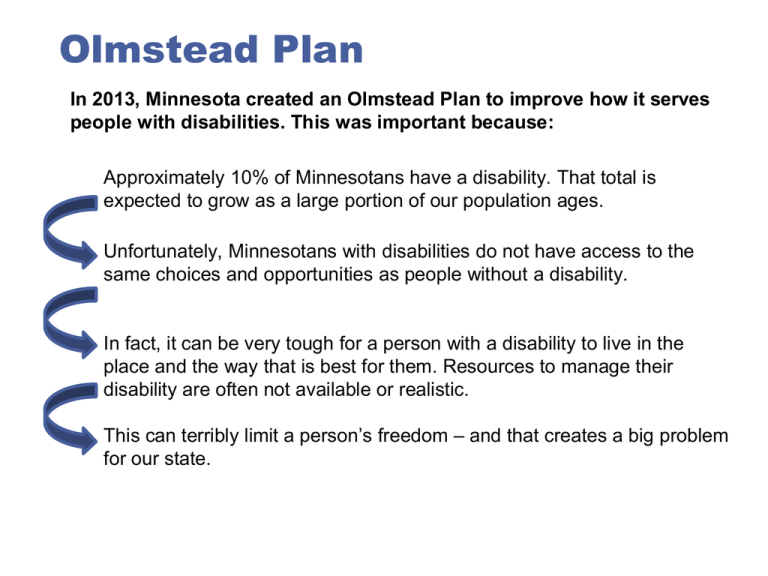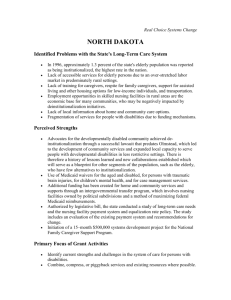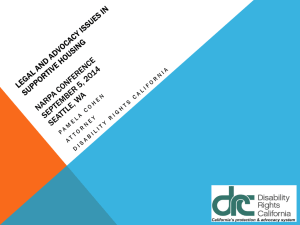MN needs to transform
advertisement

Olmstead Plan In 2013, Minnesota created an Olmstead Plan to improve how it serves people with disabilities. This was important because: Approximately 10% of Minnesotans have a disability. That total is expected to grow as a large portion of our population ages. Unfortunately, Minnesotans with disabilities do not have access to the same choices and opportunities as people without a disability. In fact, it can be very tough for a person with a disability to live in the place and the way that is best for them. Resources to manage their disability are often not available or realistic. This can terribly limit a person’s freedom – and that creates a big problem for our state. A better Minnesota for all of us Our state can’t fully thrive if people aren’t able to live in a place and a way that’s best for them. This is segregation. Healthy, educated, employed, stable people are the heart of strong, respectful, thriving communities. When our community thrives, we all benefit. Education Better Education leads to a more thoughtful population and preps people for better jobs Jobs More and better jobs create a stronger economy Housing A better economy helps stabilize housing Health Better stability increases people’s health and well being Support programs Better supports and services help people live, work and get education in ways meaningful to them The Olmstead vision How do we get there from here? The aim of Minnesota’s Olmstead Plan is to build communities that welcome, engage and respect people with disabilities at the highest level possible and more than ever before. The seven domains To do that, the Olmstead Plan outlines seven important “domains” in a person’s life. • Each of the domains must be on track for a person to fully thrive • The Plan lists goals and key activities that address each of these domains Healthcare and Healthy Living Community Engagement Transportation Lifelong Learning and Education Housing Employment Whole Person Supports and Services Accountable and effective Minnesota’s Olmstead Plan requires us to truly make a difference for people in our communities. Simply working hard is not good enough. To be successful, we need to improve the options for Minnesotans with disabilities. To do this, Olmstead goals were created to be specific, measureable and timely We are beginning to measure in three areas: Movement from segregated to integrated opportunities Getting rid of waiting lists or making sure they move at a reasonable pace Overall quality of life for people with disabilities All measurement and activities will be transparent so people can see the work and hold us accountable for it We will measure progress over a long period of time. We don’t want just a quick “snapshot” of our services, but a rich “story” of how individuals with disabilities are better off overall. It’s the Law. Improving people’s lives is the right thing to do. It’s also the law. Our Olmstead Plan complies with: The Minnesota Human Rights Act (State law) The Americans with Disabilities Act (Federal law) Both of these laws prohibit discrimination against people with disabilities. The Olmstead Plan is named after a landmark civil rights case that reached the U.S. Supreme Court. The Court’s decision in this case defined the rights of people with disabilities. The name “Olmstead” does not refer to a county in Minnesota. It is the last name of the defendant in the 1999 U.S. Supreme Court case. Minnesota’s legacy The Olmstead Plan spells out a thorough approach to transform the lives of people with disabilities. Historically, Minnesota was a national leader in community-based disability services, but over the years, our progress has faded. When we meet the Plan’s goals, Minnesota will again set the highest standards for disability services in the nation. We will become a model for other states and communities to follow. Most importantly, Olmstead will improve the lives of all Minnesotans. National leadership Progress slowed Historic leadership Olmstead information You can get more information and read Minnesota’s complete Olmstead Plan on the Olmstead Office’s website.





